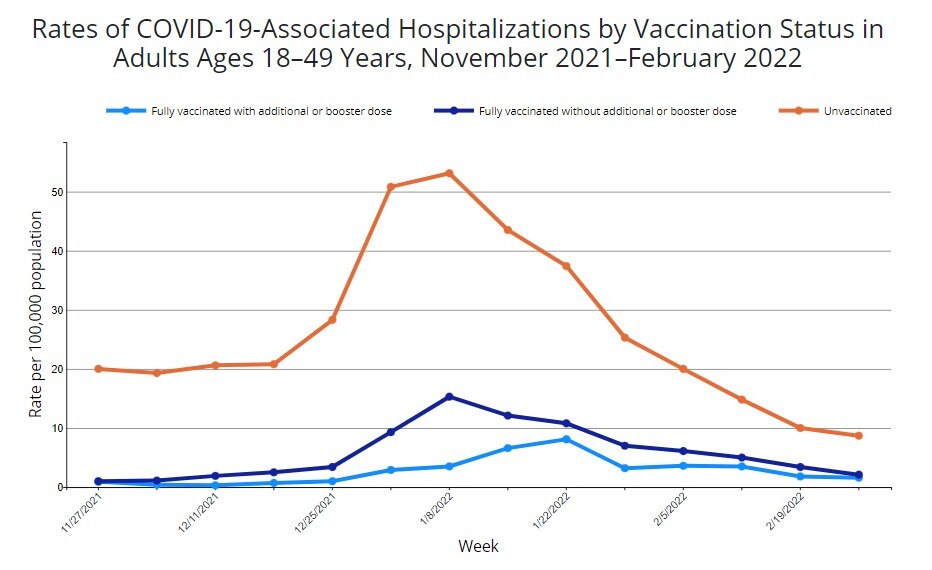SciCheck Digest
Weekly rates of COVID-19 hospitalizations and deaths by vaccination status are published monthly by the Centers for Disease Control and Prevention on its website. The death data were last posted on March 17, and the hospitalization data on March 31. But a viral tweet claimed the CDC is no longer releasing the information.
Full Story
The CDC monitors rates of COVID-19 cases and deaths and laboratory-confirmed COVID-19 hospitalizations by vaccination status and age group, and publishes data and interactive tables on its website monthly, where anyone can download them.
 According to the CDC website, COVID-19 case and death information is collected from jurisdictions that can link their case surveillance data to immunization data, and identify the vaccination status of people who test positive. The data on COVID-19 hospitalizations are collected by COVID-NET, a surveillance system that collects data on hospitalizations of children and adults with a confirmed infection through a network of over 250 hospitals in 14 states.
According to the CDC website, COVID-19 case and death information is collected from jurisdictions that can link their case surveillance data to immunization data, and identify the vaccination status of people who test positive. The data on COVID-19 hospitalizations are collected by COVID-NET, a surveillance system that collects data on hospitalizations of children and adults with a confirmed infection through a network of over 250 hospitals in 14 states.
The data are used by the agency to better understand how well the vaccines are working against SARS-CoV-2, the coronavirus that causes COVID-19.
According to this data, for example, unvaccinated people over 5 years old were 2.4 times more likely to test positive for COVID-19 and 9 times more likely to die from COVID-19 in January. And in February, unvaccinated adults ages 18 and older were 5 times more likely to have a COVID-19-associated hospitalization than fully vaccinated adults.
The COVID-19 case and death rate data by vaccination status were last updated on March 17, and cover April 2021 to Feb. 19 for cases and through Jan. 29 for deaths. The data for COVID-19-associated hospitalizations by vaccination status from January 2021 to Feb. 26 were posted on March 24, and then updated on March 31.
The agency has not communicated any intention to discontinue these publications.
“The next update for rates of cases and deaths by vaccination status will be mid-April and include case data through mid-March and death data through late February. Hospitalization rates by vaccination status will be updated end of April and will include data through the end of March. These time frames allow the subject matter experts to process and complete a thorough analysis of the data,” CDC spokeswoman Jasmine Reed told us in an email.
Yet, a March 26 tweet, which went viral, claimed that the “CDC is no longer releasing data comparing vaccinated vs unvaccinated deaths & hospitalizations.” Even though the tweet was later deleted by its author, it is still being shared on other platforms.
Scott Morefield, the author of the tweet and a weekly columnist for the conservative website Townhall, told us he wrote it after seeing Dr. Aaron Kheriaty on the March 26 episode of Fox News’ “Unfiltered with Dan Bongino.”
On the show, Kheriaty, who is against COVID-19 vaccine mandates and was recently fired from the University of California, Irvine for refusing to get vaccinated, questioned the effectiveness of vaccines that have proved to be effective in trials and in the real world. He said “we don’t know” how the COVID-19 vaccines are working in the U.S. “because the CDC is no longer releasing their data comparing vaccinated to unvaccinated cases, hospitalizations and deaths.” A Facebook post with the video, uploaded to the show’s page on March 30, has more than 37,000 views.
“A spokesperson for the CDC told the New York Times a few weeks ago, the reason that they are not releasing the data anymore, that we’ve seen throughout the pandemic, is they have worries it’s not ready for prime time because it might increase vaccine hesitancy. So what’s going on here? Why are these basic metrics being withheld from the American people?” Kheriaty said during the show.
Kheriaty was making reference to a New York Times story published on Feb. 20 that reported the CDC had “withheld critical data” on boosters, hospitalizations and wastewater analyses. In particular, the story said the CDC left out data on the effectiveness of boosters in people ages 18 to 49. A previous New York Times story had reported that, when releasing data on COVID-19-associated hospitalizations and deaths among people who are vaccinated and unvaccinated, with or without boosters, on Feb. 3, the CDC had not included “hospitalization numbers for adults 18 through 49 perhaps because the numbers were too small.” The CDC published that data on Feb. 17.

The New York Times story cited by Kheriaty added that although the agency had been collecting wastewater data showing SARS-CoV-2 RNA levels from some states and localities since the beginning of the pandemic — information that could have been useful to detect new surges of cases — the data were only made public on Feb. 4. Data from 41 states are now available. In the story, experts shared their frustration with the lack of available CDC data on boosters, more granular information on children hospitalized from COVID-19 and contagiousness of infected people after symptoms show up.
A spokesperson for the CDC, Kristen Nordlund, told the New York Times the agency “has been slow to release” some data because “it’s not ready for prime time” and because of the fear that it could be misinterpreted. But she didn’t say the agency is “not releasing the data anymore,” as Kheriaty claimed.
In an email sent to FactCheck.org on March 28, Morefield said he decided to remove his tweet after admitting that “the CDC does release some -though not all or enough- data” on an agency website. That page provides the underlying data for the agency’s COVID Data Tracker’s comparison of COVID-19 cases and deaths by vaccination status.
“[A]lthough rooted in the contention that the agency isn’t being nearly as straightforward or transparent or comprehensive as they need to be, my tweet could be interpreted as misleading and that’s the absolute last thing I want to do – so I’ve removed it,” he wrote.
But Morefield’s tweet, which claims the “CDC is no longer releasing data comparing vaccinated vs unvaccinated death & hospitalizations,” is still being shared in screenshots on social media. And that’s not correct.
Editor’s note: SciCheck’s COVID-19/Vaccination Project is made possible by a grant from the Robert Wood Johnson Foundation. The foundation has no control over FactCheck.org’s editorial decisions, and the views expressed in our articles do not necessarily reflect the views of the foundation. The goal of the project is to increase exposure to accurate information about COVID-19 and vaccines, while decreasing the impact of misinformation.
Sources
COVID Data Tracker. CDC. Rates of COVID-19 Cases and Deaths by Vaccination Status. Last updated 17 Mar 2022. Accessed 31 Mar 2022.
COVID Data Tracker. CDC. Rates of laboratory-confirmed COVID-19 hospitalizations by vaccination status. Last updated 24 Mar 2022. Accessed 1 Apr 2022.
COVID Data Tracker. CDC. SARS-CoV-2 RNA Levels in Wastewater in the United States. Last updated 31 Mar 2022. Accessed 1 Apr 2022.
Morefield, Scott. Townhall weekly columnist. Email sent to FactCheck.org. 28 Mar 2022.
Mandavilli, Apoorva. “The C.D.C. Isn’t Publishing Large Portions of the Covid Data It Collects.” The New York Times. Updated 22 Feb 2022.
Mandavilli, Apoorva. “Younger Americans Benefited Less From Booster Shots Than Older People.” The New York Times. 4 Feb 2022.
Anthes, Emily. “The C.D.C. adds wastewater data to its Covid-19 tracker.” The New York Times. 4 Feb 2022.
Reed, Jasmine. CDC, public affairs specialist. Email sent to FactCheck.org. 31 Mar 2022.